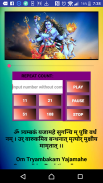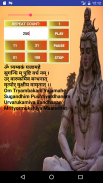





Maha Mrityunjay Mantra Jap Unlimited Times

Maha Mrityunjay Mantra Jap Unlimited Times açıklaması
Chant the powerful Maha Mrityunjaya Mantra to get the blessings of Lord Shiva. It's a great mantra for conquering death for it protects against all threats with its divine vibrations. It purifies the karmas of the soul at a deep level. It is beneficial for mental, emotional and physical health. It is also a moksha mantra which bestows longevity and immortality which is believed to be granted by Lord Shiva.
Key features of this app:
*HD Audio
*Mantra in Hindi and English.
*Repeat times: 11, 21, 51, 108.
*Special Feature: Input your number of repetitions. (unlimited times)
*Repeat Count Display.
*Play Pause Stop Buttons and Seek Bar added for ease of use.
*Small App size. (only 1.6 MB)
*NO ADS
Cheers!!!!!
#Meaning of this Mantra.
ॐ aum = is a sacred/mystical syllable in Sanatan Dharma or Hindu religions, i.e. Hinduism, Jainism, Buddhism & Sikhism.
त्र्यम्बकं tryambakam = the three-eyed one (accusative case),
त्रि + अम्बकम् = tri + ambakam = three + eye
यजामहे yajāmahe = We worship, adore, honour, revere,
सुगन्धिम् sugandhim = sweet fragrance, fragrant (accusative case),
पुष्टि puṣṭi = A well-nourished condition, thriving, prosperous, fullness of life,
वर्धनम् vardhanam = One who nourishes, strengthens, causes to increase (in health, wealth, well-being); who gladdens, exhilarates, and restores health; a good gardener,
पुष्टि-वर्धनम् = puṣṭi+vardhanam = पुष्टि: वर्धते अनेन तत् = puṣṭiḥ vardhate anena tat (samas)= The one who nourishes someone else and gives his life fullness.
उर्वारुकमिव urvārukam-iva = like the cucumber or melon (in the accusative case); or like a big peach.
Note: Some people have decomposed the compound urvārukam in this way: 'urva' means "vishal" or big and powerful or deadly; 'arukam' means 'disease'. But urva (उर्वा) does not mean 'vishal' in Sanskrit; Another possibility would be ūrva (root ऊर्व्), meaning 'to kill, hurt', which could bend the translation to 'please eradicate all disease' as ūrva is in the imperative mood. Another way: uru: big, large; ārukam (in the accusative case): peach; iva: like.
बन्धनान् bandhanān = "from captivity" {i.e. from the stem of the cucumber} (of the gourd); (the ending is actually long a, then -t, which changes to n/anusvara because of sandhi)
Note: bandhanān means bound down. Thus, read with urvārukam iva, it means 'I am bound down just like a cucumber (to a vine)'. If you read it with mṛtyormukṣīya it means 'liberate from the bounds of death'
मृत्योर्मुक्षीय mṛtyormukṣīya = Free, liberate From death
मृत्यु: + मुक्षीय = mṛtyoḥ + mukṣīya= from death + free (Vedic usage)
माऽमृतात् mā'mṛtāt can be translated in a number of different ways:
1) मा + अमृतात् = mā + amṛtāt = not + immortality, nectar
Translation would be: (Free me from death but) not from immortality.
2) मा (माम) + अमृतात् = mā (short form of mām) + amṛtāt = myself + immortality
Translation would be: Give me some life rejuvenating nectar
3) मा (माम) + अमृतात् = mā (short form of mām) + amṛtāt = myself + sure, definitely
Translation would be: Free me from certain death.
Source of Meaning: Wiki

























